Wednesday, September 20, 2006
The Iron Behind the Velvet in Thailand
After Coup Dictatorship Rules Thailand
by Giles Ji Ungpakorn Peoples Coalition Party, Turn Left newspaper and Workers' Democracy, Thailand
Last night the military staged a coup against the elected, but controversial, government of Taksin Shinawat. In the tradition of all Thai military coups for the last 60 years, the dictatorship claimed to have staged the coup in order to "reform politics" and "protect democracy". They said they had "no interest in taking personal power" and would be "returning power to the people as soon as possible". And in the tradition of many previous coups they later sought and received support from the monarchy.
The military have taken over all Thai TV channels and have blocked foreign news channels such as CNN and BBC. The TV is showing pictures of the royal family along with various declarations from the so-called "democratic reform committee".
The Thai peoples' movement had good reason to oppose the Taksin government which presided over gross human rights abuses in the south and in the so-called war on drugs and pushed for many neo-liberal policies, such as privatisation and free trade agreements. Yet the Taksin government retained huge popularity among the poor. On 2 April this year 16 million people voted for the government, as opposed to 10 million who voted against.
The reason was simple. The Thai Rak Thai government of Taksin had initiated many pro-poor policies, including a universal health care system and various measures to cut poverty. Yet many of those who joined the anti-government movement earlier this year, dismissed the electorate for being uneducated and ill-informed. Unfortunately many social movement leaders also took this position. Instead of respecting the poor and the electorate, they demanded that the king sack the government. Although the king refused to do this, the position taken by the anti-Taksin movement has helped pave the way for this coup.
It is now up to us in the peoples' movement to once again struggle for democracy in Thailand. This struggle for democracy can be the only road to real and lasting political and social reform which is much needed in order to make Thai society a more just and peaceful society. In the near future we shall have to make sure that the Thai Social Forum takes place in late October this year and that this forum creates a nucleus for democracy and social justice.


Monday, September 18, 2006
The Rise of the Radical Stencil



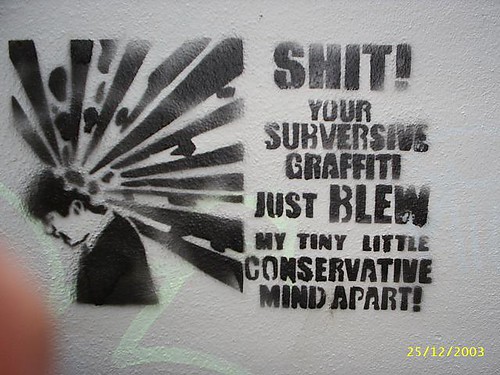
There is graffiti all over my neighborhood; some is of the generic gang-related variety but most of it is pretty creative and gives our apartment blocks a lot of character. The neighborhood is mostly Latin American and the mural traditions of Mexico and Nicaragua are also all over this corner of Detroit. The logo of the Farmworkers Union pops up on buildings constantly, and images of Zapata and 'la raza unidad' can be found too.
But I was still startled to see a large, detailed portrait of Noam Chomsky on the dumpster at the end of my street. Nothing really prepares you for that oddity. I walked over to it and discovered it was a stencil painting. Within weeks I had seen stencils, many expressing anti-militarist or anti-capitalist ideas, in a dozen locations and when I brought it up to friends on the coasts or in other cities they confirmed that leftwing stencil art had indeed invaded their neighborhood, too.
And really it's so brilliant I can't figure out why activists didn't start doing this ages ago.
I mean even the best poster-weatpasting can't weather a northern winter-- but paint has a lifespan! And according to the DIY guides you can find on the internet, making a decent stencil is pretty damn easy. --Brad
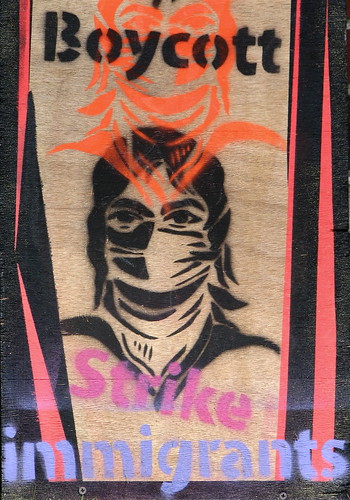
 Seattle, Washington
Seattle, Washington



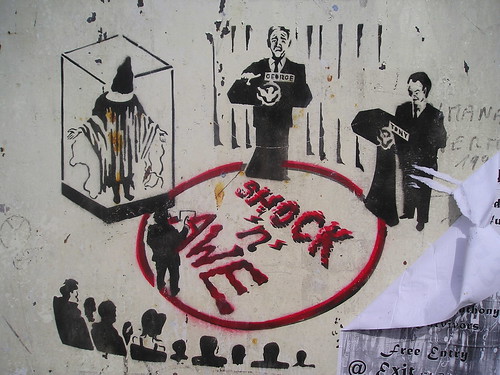
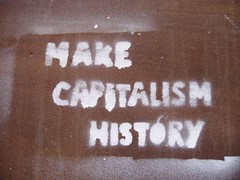
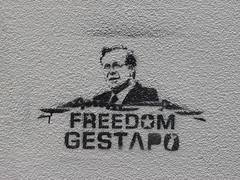
Glasgow, Scotland and London, England (above and left), Canberra, Australia (right)
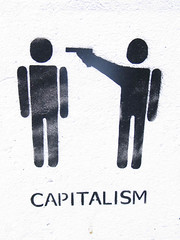

Dublin, Ireland and Santiago, Chile


San Fransisco, California and Rome, Italy
Saturday, September 16, 2006
Ron Lare talks about the Ford buyouts and the UAW
Well they called again. This time they were doing a show on the buyouts at Ford Motor Co., what this would mean for the UAW, etc and wanted to know if I knew any auto workers they could talk to (knowing I live in Detroit).
I immedidately gave them the phone numbers of Ron Lare and Judy Wright, and then called up Labor Notes for three or four other numbers. I was pretty excited that I got to connect BBC radio with these people, who are dear friends of mine and who have BOTH taught me a lot about politics. There is no better trade union activists in Detroit to talk to about what's going on at Ford and in the UAW.
So after I gave her these phone numbers the woman form the BBC asked
"So, are these people Democrats?", and I said
"I think they are a little too pro-union to be Democrats"
"Oh, interesting"
"Yeah,these are people you would call 'shopfloor militants'"
Later that day my comrade Aaron in Ann Arbor called and yells in to the phone "Ron Lare is on PBS right now!!!!". I guess I'm not the only one who knew he was the guy to talk to.
-BRAD
Ron Lare
Ford employee
I think the UAW members are their best resource, and I think they're cutting back more than they need to. And certainly, I think this is the fault of bad management, not the fault of the workers.
A worker considers his options
RAY SUAREZ: Ron Lare, what kind of work do you do for Ford?
RON LARE, Member, United Autoworkers Union: I'm a skilled tradesperson, tool- and dye-maker at the Ford Rouge plant.
RAY SUAREZ: What does a tool- and dye-maker do?
RON LARE: Tool- and dye-maker makes or maintains machines that stamp metal parts.
RAY SUAREZ: And will Ford no longer need people like you? When they offer a buyout to all 75,000 production workers, how do they make sure they still have who they need?
RON LARE: Well, I think that's a very good question. I think they are going to get rid of more people than they can afford to. I think the UAW members are their best resource, and I think they're cutting back more than they need to. And certainly, I think this is the fault of bad management, not the fault of the workers.
RAY SUAREZ: Well, what goes into your decision of whether or not to take the buyout? What do you have to consider before you know whether you can take Ford up on the offer?
RON LARE: Well, there are some personal considerations. I'm 59 years old, but I have a young daughter. I'd like to spend more time with her. On the other hand, I need to save for her education. And I'd also like to stay in the fight to make the UAW stronger, because we're going to need that to be a fighting union again.
RAY SUAREZ: Have you had a chance to talk with fellow workers, especially those in your boat who might have thought of themselves as a little too young to retire, but kind of old to start over on a work career?
RON LARE: Well, yes, I have, and there's a very wide range of views from people. Some people are trying to recover from the news itself, although it wasn't totally unexpected. Many are angry at Ford management.
And others say that the UAW -- and others like myself say that the UAW needs to organize the transplant facilities in the U.S. from other auto companies around the world, and we can do that only with some changes in the UAW.
Looking elsewhere for jobs
RAY SUAREZ: Rebecca Lindland, a lot of guys and women, like Ron Lare, have lost their jobs working for the big three over the last decade, yet there are foreign plants popping up all over the country. Why don't those workers get those new jobs?
REBECCA LINDLAND: Well, because they're nonunion jobs, as Mr. Lare referred to. The transplant new factories, which are primarily moving into the South, are nonunion plants.
They tend to pay significantly less sometimes or, in fact, their health benefits are really the big difference that you'll see at a transplant location. And we talk about transplants, basically the imports like Honda, Toyota, Nissan, Kia, Hyundai, building plants here in the U.S., but those plants are nonunion.
RAY SUAREZ: And so even middle-aged workers, workers still in their 30s and 40s, if they were willing to relocate, could they vie for jobs in Kentucky, Alabama, South Carolina, some of the states where those new plants have gone?
REBECCA LINDLAND: You know, Mr. Lare would actually probably be a better person to answer that. I'm not sure if the union prohibits you from taking a job with a nonunion facility. Does it, Mr. Lare?
RAY SUAREZ: Ron Lare?
RON LARE: Well, one would have to leave the company one is at now and give up a lot of seniority, so that would be a very risky proposition.
REBECCA LINDLAND: For younger workers, maybe.
RAY SUAREZ: Yes, yes, especially if you're not in line for a lot of money, the way the buyout plan has been structured, it might look like more of a proposition for you.
Csaba Csere, this must be hitting Michigan hard.
CSABA CSERE: Well, it's hitting Michigan extremely hard. The state already has the highest unemployment rate in the country. A lot of that unemployment is concentrated around the Detroit area. And ultimately, Detroit is still a company town, and the company is the domestic auto industry. And all three companies are hurting to a greater or lesser extent.
There have already been a large number of layoffs, both blue-collar and white-collar. There is a large number of layoffs already scheduled that haven't even happened at General Motors. And now Ford is bringing this forward, and it's extremely hard on southeastern Michigan.
RAY SUAREZ: And is there no compensating inflow of new manufacturing or investment that will soak up some of this workforce?
CSABA CSERE: Not terribly much, really. Part of the problem is that, for an awful lot of the manufacturing in the United States, it is going nonunion, and this is a very strongly union area of the country, and there isn't really that much moving in here.
I believe in the last census Michigan actually didn't gain much population. In the last five years that they looked at, the state is losing people, and it's because these jobs are going away.


Friday, September 15, 2006
Explosive protests against pollution rock Ivory Coast




Ivory Coast Pollution Worse Than First Thought
GENEVA (AP) — Protesters angry about recent toxic waste dumping around Ivory Coast's commercial capital attacked the country's transport minister Friday, pulling him from his car at a roadblock and beating him, a party official said. The protesters recognized Transport Minister Innocent Kobenan Anaky in his car and then attacked the vehicle, said Joel N'Guessan, the vice president of Anaky's party.
"They attacked him with anything they could find," N'Guessan said. "Then they burnt his car."
N'Guessan said Anaky managed to escape with injuries to his face.
Some 9,000 people have reported to health facilities in the weeks since the material apparently was illegally dumped around Abidjan, with 19 people requiring hospitalization, according to the Health Ministry. Spokesman Jean Denoman said six people died from exposure to the waste.
Hundreds of youth blocked the road to the main garbage disposal site in Abidjan on Friday and burned tires and shouted in protest. Police arrived to try to contain the situation.
"People want to breathe. They have the impression that nobody is doing anything, while this is a national catastrophe," said a protester in his 20s who only gave his name as Major.
Abidjan residents began complaining of an offensive stench in recent weeks and Trafigura Beheer B.V., a Dutch-based commodities company, said a local contractor may have improperly disposed of a byproduct from a fuel shipment sent to the West African nation.
Prime Minister Charles Konan Banny said Thursday that he has launched an investigation into the dumping and suspended three high-ranking officials: the general manager of the Abidjan port, the general manager of customs, and the governor of Abidjan district.
A U.N. report issued Thursday said up to 14 open-air sites have been contaminated by toxic waste. Previously 11 sites had been reported contaminated.
Eight of the sites already have been confirmed, including the main garbage dump, U.N. Office for the Coordination of Humanitarian Affairs said, adding that the full extent of the toxic spill was not yet clear.
Among the substances found in the petrochemical waste are hydrogen sulfide and hydrocarbons, which can be harmful to humans and the environment, OCHA said.
Three experts from the World Health Organization will visit Abidjan's hospitals to evaluate the health consequences and establish how many people have been affected, said WHO spokeswoman Fadela Chaib. People were suffering from respiratory problems, headaches, vomiting and nosebleeds, she said.
The black substance was discovered by residents, who took to the streets last week to complain about persistent health problems and a pervading smell of rotten eggs near their homes.
Mounting public anger resulted in the resignation of a postwar, power-sharing government last week. Banny, who remains in office, was expected to announce a new Cabinet by the end of this week.
Authorities have arrested seven people in connection with the dumping, including three customs officials and a high-ranking official at the Transport Ministry, according to local news reports.
More on the unfolding rebellious season in Mexico

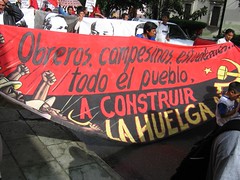


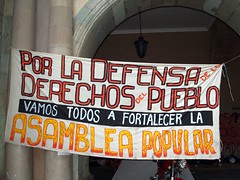

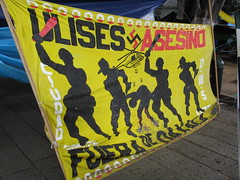
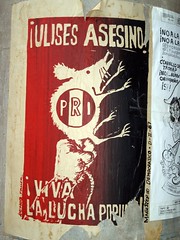
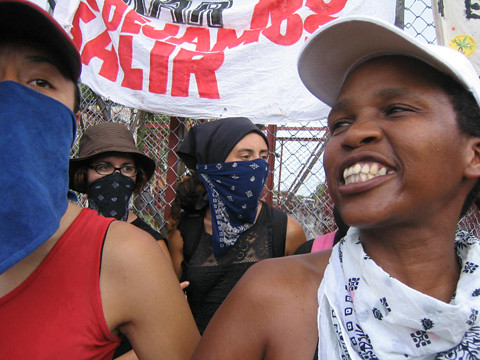
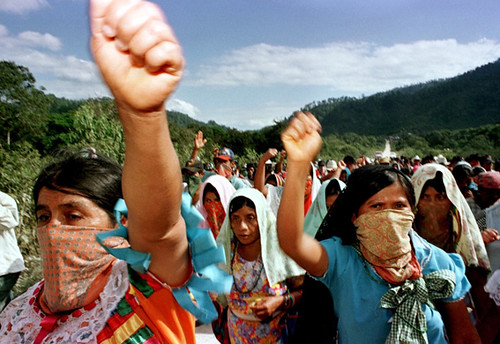
Tuesday, September 12, 2006
Political and Cultural Murals of Los Angeles, California 1990's-2000's
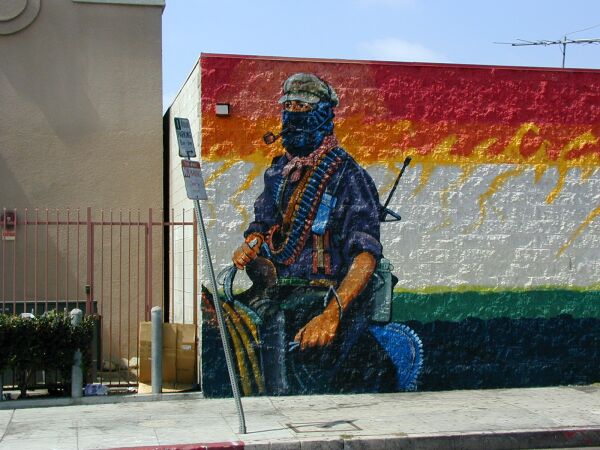
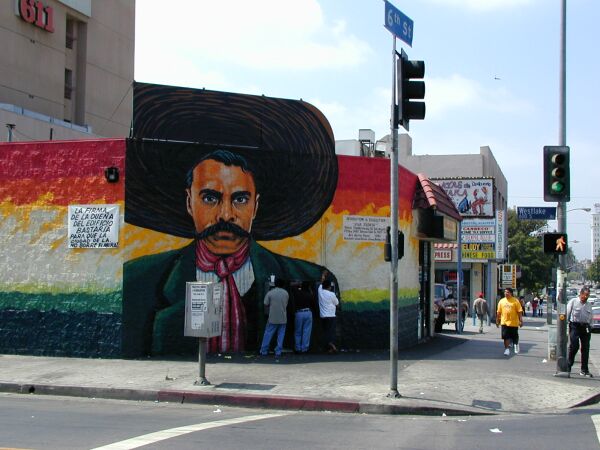
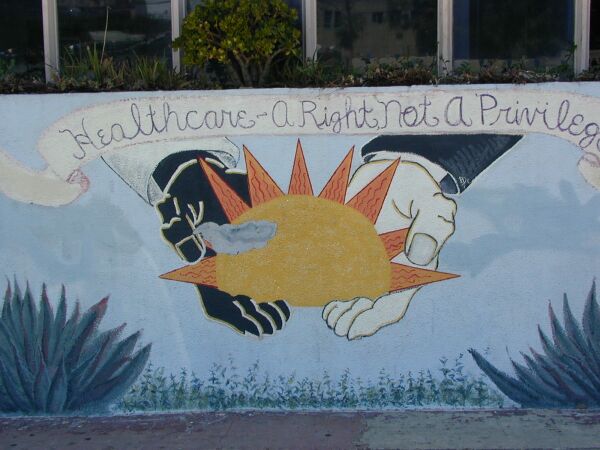
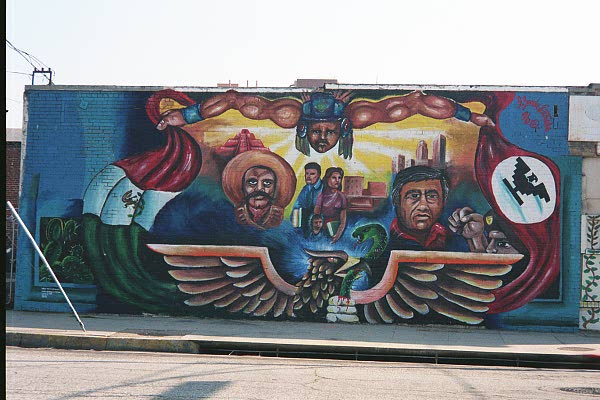
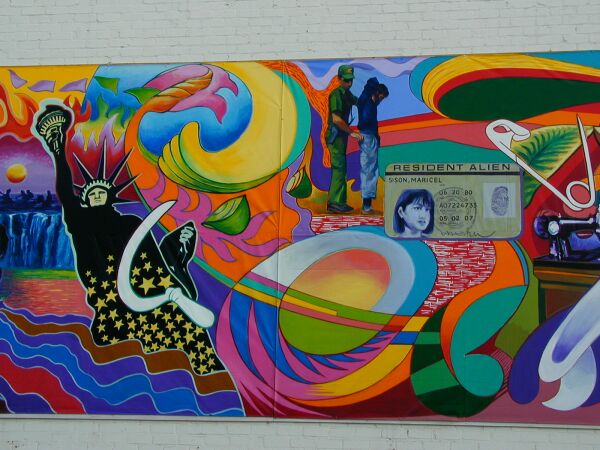



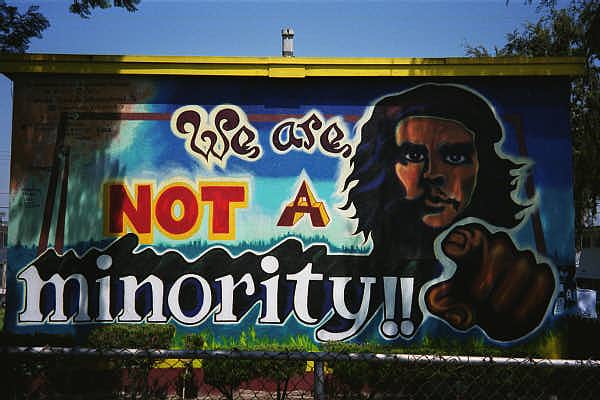
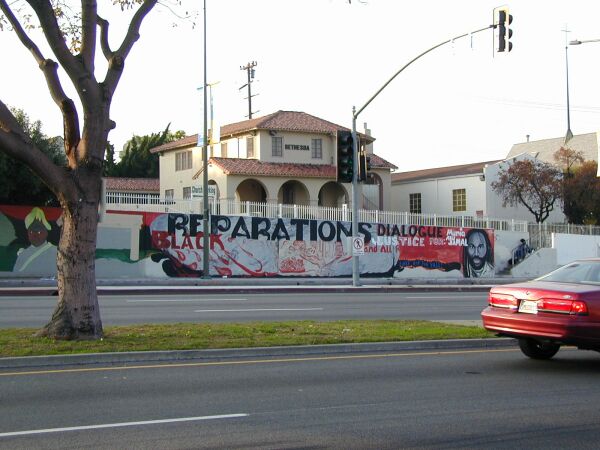
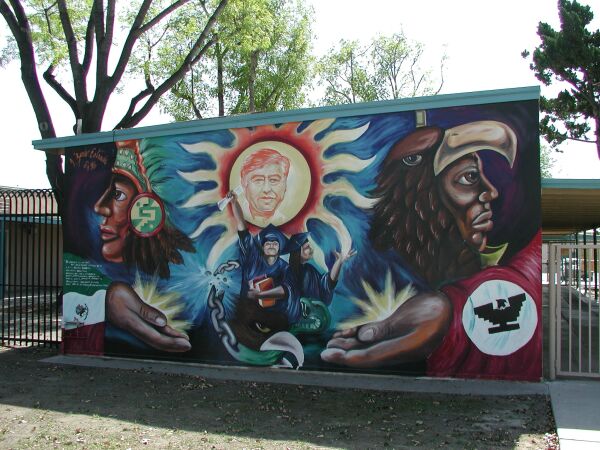
Monday, September 11, 2006
Posters of the Palestinian struggle: 1970's and 80's












